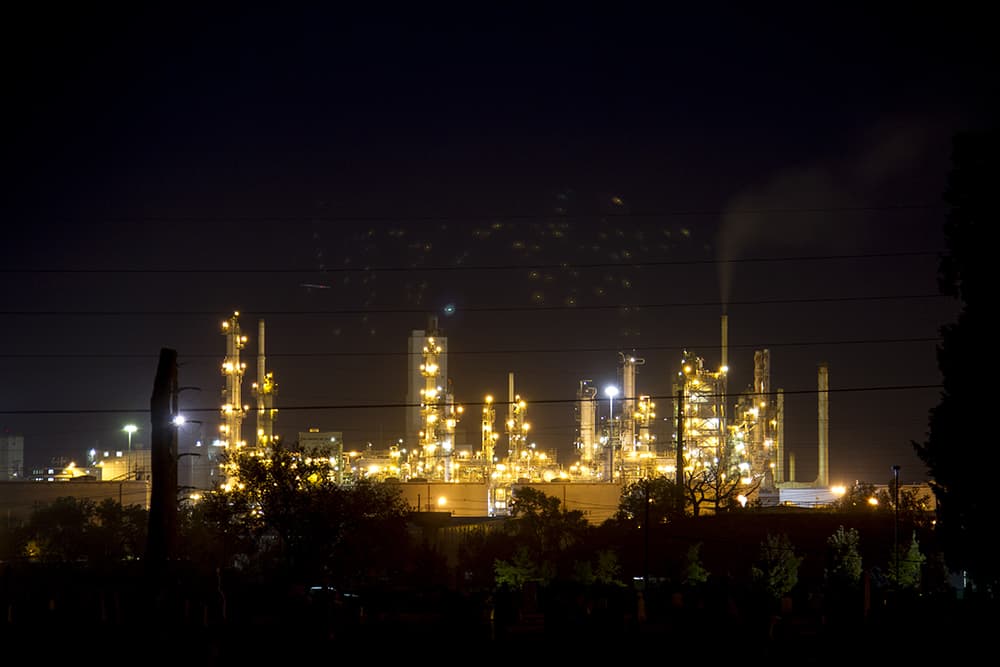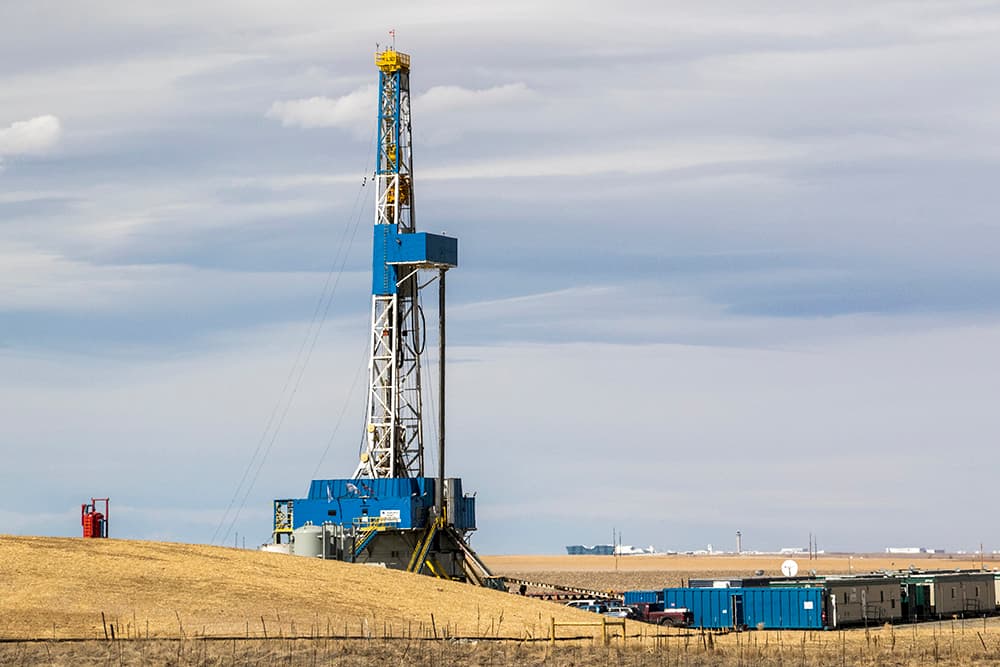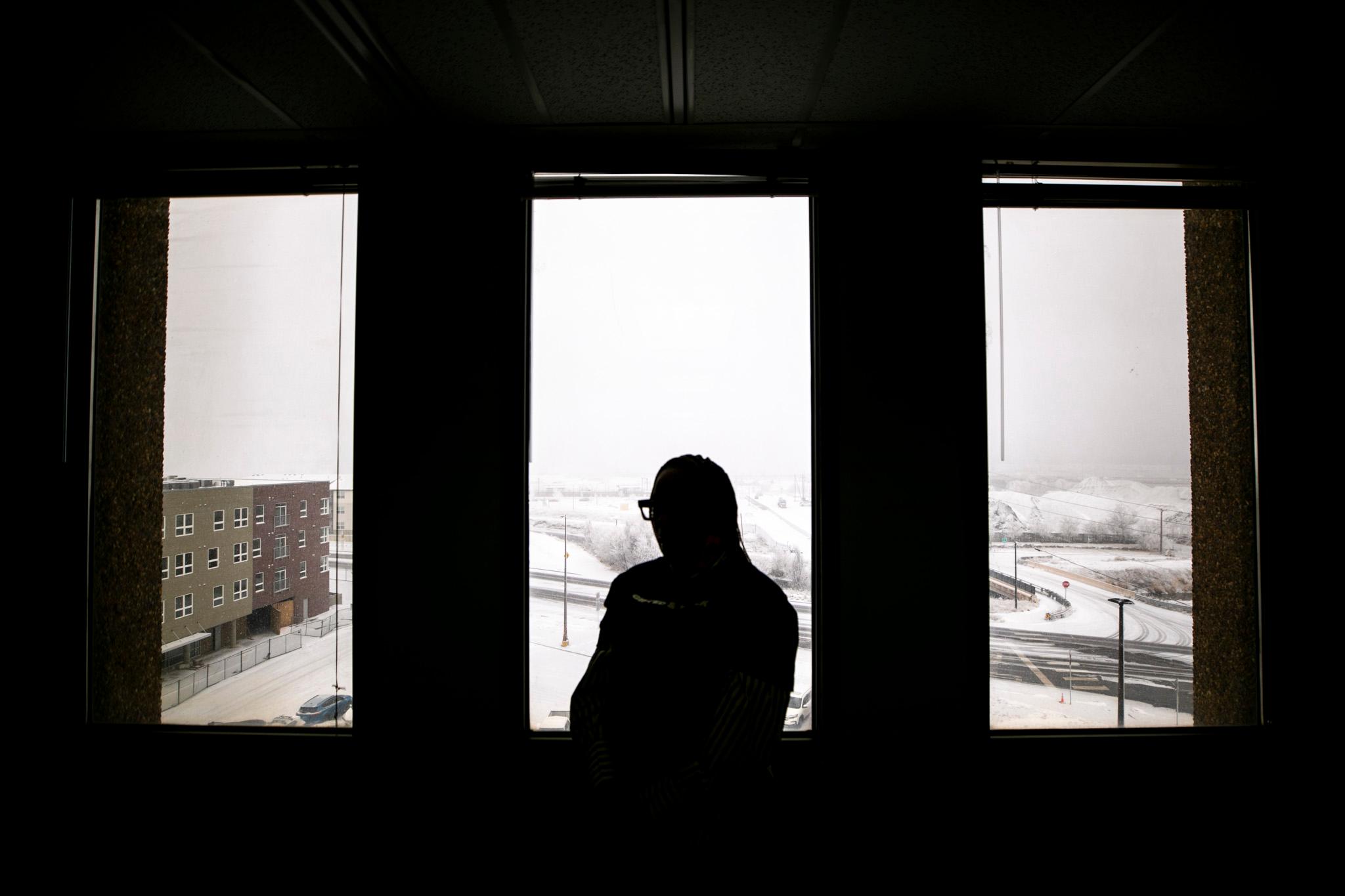This is part of Living in Denver, a series about people navigating the metro and its challenges.
Nikie Wells looks out from her Commerce City office at a sweeping view of the Rockies — and the smog.
“It’s beautiful,” she says. “But it’s not.”
Gas-guzzling trucks rumble on the nearby interstate. The Suncor refinery spews pollution into the air. In the middle of all that, affordable housing is rising. She worries about the people who will soon live there.
She doesn’t want them to suffer from asthma, as she and her son do. She doesn’t want them to die from cancer, as her father, a former Denver waste collector, recently did. She blames her family’s health problems on corporations dumping environmental toxins on her community.
For most of her 44 years, she’s lived in working-class neighborhoods in east Denver and Aurora — communities historically plagued by pollution and ignored by the government.
Too often, people are so worried about affording the basics that they ignore the environmental factors killing them, she says. Wells lived that experience.
“I was in a bubble of survival,” she says.
Now, she’s fighting back by participating in an Environmental Protection Agency-funded citizen-led air-quality-testing project with Harvard University. Wells is the environmental justice director of the Black Parents United Foundation.
“When are people going to be put over profit?” she wonders.

As a kid in the 1980s, Wells moved between east Denver and Aurora.
Wells was focused on getting by.
“It was in the height of the crack era,” she says. “Black and brown neighborhoods were taken over by drugs and alcohol.”
Both her parents suffered from addiction, and she blamed herself, feeling unlovable. Her dad eventually quit drugs, but her mother is still “fighting demons” from childhood traumas, Wells says.
Wells’ childhood neighborhoods faced the same issues. Drugs. Poverty. Crime. And the environmental factors that don’t always make TV newscasts: bad soil, water and air.
But she didn’t have time to worry about those big issues. Her family couldn’t always pay rent. She found herself gangbanging. After that, she struggled to stay employed.

Life was increasingly unaffordable in Denver.
As a young woman, she stayed in her relatives’ overcrowded apartments. She couldn’t afford rising rents in neighborhoods suffering from rapid gentrification. At 20 years old, she got pregnant and started working multiple jobs. But she still couldn’t pay the bills without help.
She lived in public housing and fed her family on food stamps.
She married a man who agreed to support her, as long as she quit working. She felt trapped in the seven-year relationship and plummeted into depression.
Wells eventually managed to find affordable childcare and soon after applied for a job at the same daycare center, too.
Her husband drove her to the interview. On the way, they fought, and he kicked her out of the car. She wept. Though she was obviously late, she walked to the job interview anyhow.
When she finally arrived, her future boss was in the parking lot, ready to leave.
“I need this job,” she said, crying. “I’ve got to take care of my babies.”
Knowing she was a reliable volunteer, he hired her on the spot. She worked at that daycare, among other jobs, for the next eight years, and eventually left her husband.
“I’m with these kids more than I’m with my own kids,” she says.
As a single mom, she has worked constantly — multiple jobs, hours away from her kids. Childcare. Babysitting, nannying on the side, shooting photographs, working at Arby’s, and even face painting.
Air pollution was the last thing on her mind.

Then health issues struck.
At four years old, her son was diagnosed with asthma. The doctors suspected bad air. The National Institutes of Health has linked asthma with certain air pollutants.
Wells herself caught a case of bronchitis, and it didn’t go away. Her breathing suffered. Doctors diagnosed her with asthma and gave her a nebulizer and steroid rescue inhalers.
Though she was working more than full-time, she could not afford insurance on her own. Medicaid paid the costs of inhalers for both her and her son.
Sure, corporations might be dumping toxins on her community. But she didn’t have time to think about that. She just needed to get by.
In recent years, Wells realized her struggles weren’t just fate.
She met Lucy Molina, an organizer with the Black Parents United Fund. Wells told her about the neighborhoods she lived in, addiction, the cost of living, and the pollution she grew up with, and the health consequences she faced.
That is environmental racism, Molina told her.
Molina explained that city governments all but abandon working-class neighborhoods. Businesses dump pollution on communities of color. Schools do little to ensure kids have healthy meals. Poverty isn’t an inevitability but the result of policy choices.
“I didn’t know these were injustices,” she says. “I was in survival mode.”
The Denver and Aurora area ranks as the sixth worst for high ozone days out of 228 metropolitan areas and 20th worst out of 223 metros for 24-hour particle pollution, according to the American Lung Association. Neighborhoods like Globeville, where she had lived for spells, had been ranked as one of the most polluted in the country.
Communities of color live in the most toxic neighborhoods in Denver, a reflection of historic discriminatory practices like redlining, according to a University of Colorado Boulder researcher’s paper in the journal Environmental Science and Technology.
“Once you hear it, once you feel it,” Wells says. “Once you taste it, you can never go back to the bubble you lived in.”

She left early childhood education to start working for BPUF, an organization doing advocacy work for Black and brown families. Her new job paid better than teaching kids, but it was also just enough to make her ineligible for Medicaid and other benefits.
“I’m 44 years old, I have two inhalers … My inhalers are $500 and $200 each. Every month,” she says. “I’m full-blown asthmatic. I can’t go anywhere without inhalers.”
Still, she saved up enough money to buy a home. But the only places she can afford are near heavy industry, and she’s not ready to make the leap.
“They’re fracking right in our backyard,” she says of her would-be neighborhood. Neighbors in the area she’s looking told her they suffered from nose bleeds, headaches and cancer. An expert with the Yale School of Medicine recently said that though evidence about fracking is “not conclusive,” it’s linked to impacts on children’s health, including asthma and cancers.
For now, Wells is still renting in the city: $2,596 a month for a house.
Worrying isn’t enough.
Wells and her team at BPUF believe increased oil and gas drilling near Aurora is causing many of the issues. Through their planned air-quality monitoring project, they hope to provide more evidence.
The nonprofit has received a federal grant from the Environmental Protection Agency. Working with researchers at Harvard University, they plan to spend a year monitoring methane, radioactivity and other air pollution they blame on fracking, transportation and other industries in the metro.
They plan to report the data in real-time on a public website, ranking air quality on a scale from hazardous to good.
With the data, they hope to educate Aurora residents and policymakers about the impacts of corporate pollution and use the information to keep each other safe.
Six months after collecting data, the researchers will publish a report looking at the potential health effects of pollutants, where they are concentrated, and where they are coming from. They hope to publish the story in a peer-reviewed journal.
The study will cost more than $380,000. Much of that will be funded by Harvard; the rest was pledged by the EPA.

But there was a hitch.
Weeks into President Donald Trump’s administration, her group had not received the check from the EPA. And the Trump administration has been slashing funding for programs rooted in diversity, equity and inclusion.
Rick Cohen, the chief operating officer of the National Council of Nonprofits, says thousands of federally funded nonprofits are shutting their doors, laying people off or are deeply uncertain about what happens next.
Wells and BPUF were worried. Would a Black family organization focused on environmental justice get the funding it was promised during Biden’s era?
Cohen’s take: Projects like BPUF’s are in danger. The use of a keyword like “women” or “diverse” could put some federally funded projects in the crosshairs of a review. The nonprofit sector, the third largest employer in the country, is facing an economic crisis that far exceeds those of the Great Recession and the COVID-19 pandemic, Cohen says.
His organization is part of a lawsuit trying to slow down federal orders – and dozens of other legal challenges are trying to stop the gutting of federal contracts with nonprofits and others.
“It has us up at night right now, just trying to find ways to do everything we can to help these groups continue to do what they do every day,” Cohen said. “All they want to do is help people in their community. They want to make the world a better place.”
After two weeks of anxiety over whether the funding would come, Wells learned the EPA released the grant. The check was cut. The study will move forward.
From her office, Wells often can’t see the skyline.
Outside, she struggles to breathe. Going for a walk is sometimes impossible.
The kind of research BPUF is planning is urgent. For her family. For all. And the data collected could combat the message she hears from government officials and corporations: Don’t worry. You’re safe.
People, she says, deserve the truth about what’s in the air. And she’s grateful her project will continue.
“It’s crazy how industry has been so rigged for decades,” she says.
But communities are mobilizing, she says. Organizations like BPUF are continuing their work — even as uncertainty sweeps environmental researchers, the nonprofit sector and federal agencies.
“The people gotta take this country back and rise up and fight for change,” Wells says. “Because we're going to continue to die if we don't.”
Is there someone you would like to see profiled in Denver? Maybe they have an interesting story, they’ve accomplished something great or they can simply tell us something about the city. Email [email protected].











